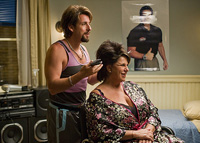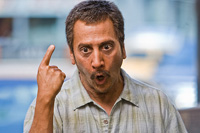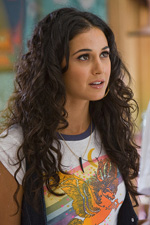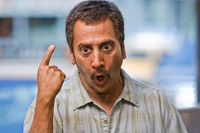Recent attempts to tackle the Middle East on film have been, shall we say, less than successful, certainly in box-office terms. Moviegoers didn’t seem to mind watching soldiers run around the desert in an overpriced popcorn movie like Transformers, but the moment things turned serious or dramatic, as they did in such very topical films as Rendition, Stop Loss and Lions for Lambs, audiences stayed away in droves.
So now filmmakers are trying a different approach: comedy. From Morgan Spurlock’s documentary Where in the World Is Osama Bin Laden?, which didn’t make much of an impression, to the stoner sequel Harold & Kumar Escape from Guantanamo Bay, which earned more than twice as much as the first Harold & Kumar film did, the studios are taking a page from Jon Stewart and Stephen Colbert and hoping that war-weary audiences will at least be ready to laugh at the world’s problems.

Enter You Don’t Mess with the Zohan, which stars Adam Sandler as a sort of “superheroic” Israeli counter-terrorism agent whose ridiculously over-the-top skills—punching through walls, catching bullets in his nose, doing push-ups with nothing more than his feet touching the ground, and so on—are more cartoonish than anything else. The funny thing is, Zohan is sick of fighting Palestinians and wants to quit it all so that he can be a hairdresser. That’s right, a hairdresser. And he even fakes his death—or, rather, allows his fellow Israelis to think he has been killed—so that he can run away to America and get a job in a hair salon, where it turns out he has an irresistible sexual appeal to the older female clientele.
Veering from something as serious as the Middle East to something as relatively frivolous as hairstyling and promiscuous sex is either daring or offensive, depending on your point of view. But it certainly fits the sensibility of Sandler, a proud Jew (think “The Hanukkah Song”) with a pronounced political streak (think the pro-Giuliani and pro-gay marriage messages in I Now Pronounce You Chuck & Larry) who also revels in some of the stupidest frat-boy and below-the-belt humor ever seen on the big screen (think, oh, just about every Sandler film ever made—not counting his rare, and surprisingly effective, turns as a dramatic actor in Reign Over Me, etc.).
The film actually begins with the silly stuff, as Zohan (Sandler) struts his stuff on a beach, wins ridiculously lop-sided games of tug-of-war, does some barbecuing in the nude, and throws things in the air using his, um, rear-end muscles. But then his vacation is cut short when a helicopter comes to pick him up and bring him back to headquarters for an emergency assignment. It seems a terrorist named The Phantom (John Turturro)—who was once caught by Zohan, but was returned to the Palestinians by the Israelis as part of a prisoner-exchange deal—is wreaking havoc again, and a frustrated Zohan volunteers once again to catch the guy.

This leads to some bizarre gags that either satirize the way the Israeli situation has been trivialized and turned into cliché by the media, or contribute to that sad trivialization, depending on how you see it. For example, as Zohan chases the Phantom, a bunch of children throw rocks at the Israeli counter-terrorist—and he catches them all and fuses them all together and hands them back in the shape of a dog, the way a clown might get animal shapes out of a string of balloons.
But then Zohan moves, incognito, to the United States, and learns that the only salon that will have him in any capacity happens to be on the Arab side of the street, across from the Israeli shops. Zohan is suspicious, but Oori (Ido Mossri), an Israeli émigré who recognizes Zohan, assures him that everyone gets along in America. And there, Zohan—who has already had sex with his roommate’s mother (Lainie Kazan) to thank her for dinner—begins coming on to the female clients, starting with a woman played by Charlotte Rae, the 82-year-old former Facts of Life star.
And so all the political humor that works on some level because it seems so edgy is almost displaced by a somewhat more conventional, and thus less interesting, series of gags involving sexual arousal and the like. Curiously, Zohan is almost never shown cutting anyone’s hair; all the montages in which he gets his clients excited consist of washing and shampooing. Eventually, even Zohan gets bored of the non-stop sex—all with older women—and begins to fall in love with his Palestinian boss, Dalia (Emmanuelle Chriqui), who is much closer to his own age.

But politics of some sort is never far from view, and just as I Now Pronounce You Chuck & Larry ended on a didactic note, so too You Don’t Mess with the Zohan has scenes in which Israelis and Arabs vent all their frustrations, peacefully and verbally, before finding that they agree on the sexual allure of various presidents’ and senators’ wives. But while all these racial and cultural barriers are being broken, two easy stereotypes remain firmly intact: the evil white businessman, and the evil white redneck.
It seems a wealthy tycoon named Wallbridge (Michael Buffer) wants to build a new shopping mall on the street where the Israeli and Palestinian shops are, and he hires some racist thugs, led by a man named James (Dave Matthews), to stir up trouble by posing as one ethnic group or the other. James, after delighting in the fact that he can now disturb “Jews and terrorists” at the same time, commends Wallbridge for being the only rich man he can stand—besides Mel Gibson. (Alas, Gibson’s drunk-driving anti-Semitic comments do open him up to this sort of scorn. Thankfully, no one explicitly links these characters to the Church or to The Passion of the Christ specifically.)

The film, written by Sandler with his former roommate Judd Apatow (director of Knocked Up) and his fellow Saturday Night Live alumnus Robert Smigel (creator of “The Ambiguously Gay Duo”), does have some pleasant surprises. I never thought I’d say this, but Sandler buddy Rob Schneider practically steals the show as Salim, a Palestinian cab driver who recognizes Zohan and plots his revenge; the scene in which he tries to dial a really long phone number, in order to speak to someone in the Middle East, is a minor masterpiece of comic timing. And, perhaps without realizing it, the film presents an excellent example of “turning the other cheek”—a concept that Jesus taught during a similarly turbulent time in the Holy Land.
But the positive messages are practically drowned out by the film’s relentless crude humor, much of which is too dumb to be all that funny. And what exactly is the positive message here? While peace of a sort is depicted as possible between Israelis and Palestinians, it occurs only in the United States; the Holy Land itself remains a problem that, for these characters at least, may as well be abandoned because it cannot be resolved. (As Eric Kohn has put it, “Zohan isn’t pro-Israel or pro-Palestine; it’s pro-America.”) So beneath the laughter, a sense of hopelessness remains, and the film’s efforts to depict some sort of reconciliation never quite overcome it.
Talk About It
Discussion starters- Is it okay to make comedies about the Middle East? Why or why not? How does humor help people cope with violent or turbulent situations? Does it ever help people to do more than cope? Does it point to something better?
- What does this film have to say about “turning the other cheek” (see Matthew 5:39, Luke 6:29)? How is the modern situation in the Holy Land similar to or different from the situation in which Jesus spoke? Have you always understood the phrase metaphorically, or have you ever seen someone literally turn the other cheek, in a film or in real life?
- How does the film depict Zohan? Is he always a hero, or does he do any bad things himself? What about the flashback involving Salim’s goat? Do Zohan’s actions in Israel justify any of the things that Salim tries to do to get revenge in the U.S.?
- Do you think the film favors the Israeli or Palestinian side of the conflict in the Holy Land? Why or why not?
The Family Corner
For parents to considerYou Don’t Mess with the Zohan is rated PG-13 for crude and sexual content throughout (including frequent references to genitalia and implied depictions of sexual activity), language (maybe half-a-dozen four-letter words) and nudity (a man’s naked bottom is seen a few times). The film also has cartoonish violence, some of it rooted in parodies of Middle Eastern violence (an Israeli agent fights some Palestinian terrorists, etc.), some of it more broadly slapstick (a man stabs himself in the leg, etc.). Also, Zohan’s friends and family joke that he is a “faygele“—a Yiddish word meaning “homosexual”—when they learn that he wants to be a hairdresser, and one scene involves a racist redneck suddenly finding himself surrounded by famous gay men.
Photos © Copyright Columbia Pictures
Copyright © 2008 Christianity Today. Click for reprint information.












